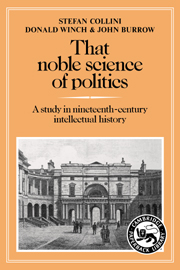Book contents
- Frontmatter
- Contents
- Preface
- PROLOGUE: The governing science: things political and the intellectual historian
- I The system of the North: Dugald Stewart and his pupils
- II Higher maxims: happiness versus wealth in Malthus and Ricardo
- III The cause of good government: Philosophic Whigs versus Philosophic Radicals
- IV The tendencies of things: John Stuart Mill and the philosophic method
- V Sense and circumstances: Bagehot and the nature of political understanding
- VI All that glitters: political science and the lessons of history
- VII The clue to the maze: the appeal of the Comparative Method
- VIII Particular polities: political economy and the historical method
- IX The ordinary experience of civilised life: Sidgwick and the method of reflective analysis
- X A separate science: polity and society in Marshall's economics
- XI A place in the syllabus: political science at Cambridge
- EPILOGUE: A nebulous province: the science of politics in the early twentieth century
- Index
VI - All that glitters: political science and the lessons of history
Published online by Cambridge University Press: 17 September 2009
- Frontmatter
- Contents
- Preface
- PROLOGUE: The governing science: things political and the intellectual historian
- I The system of the North: Dugald Stewart and his pupils
- II Higher maxims: happiness versus wealth in Malthus and Ricardo
- III The cause of good government: Philosophic Whigs versus Philosophic Radicals
- IV The tendencies of things: John Stuart Mill and the philosophic method
- V Sense and circumstances: Bagehot and the nature of political understanding
- VI All that glitters: political science and the lessons of history
- VII The clue to the maze: the appeal of the Comparative Method
- VIII Particular polities: political economy and the historical method
- IX The ordinary experience of civilised life: Sidgwick and the method of reflective analysis
- X A separate science: polity and society in Marshall's economics
- XI A place in the syllabus: political science at Cambridge
- EPILOGUE: A nebulous province: the science of politics in the early twentieth century
- Index
Summary
If history has no truths to teach, its facts are but little worth, and the truths of political science belong as much to an historian as those of theology to a professor of divinity.
thomas arnold, in A. P. Stanley, The Life and Correspondence of Thomas Arnold (1844)The science of politics is the one science that is deposited by the stream of history, like the grains of gold in the sand of a river; and the knowledge of the past, the record of truths revealed by experience, is eminently practical, as an instrument of action and a power that goes to the making of the future.
lord acton, Inaugural Lecture on the Study of History, delivered at Cambridge, June 1895the belief that history provides examples and warnings to statesmen is as ancient, at least, as Thucydides, and the passage quoted above from Lord Acton's inaugural lecture may well have been intended and taken as little more than a reassuring and timeless platitude. Nevertheless, the thought of the nineteenth century had been, as Acton went on to say, imbued to an extraordinary extent with a sense of the importance of the historical perspective. It was an influence which left its stamp on attempts to confront the requirements of a science of politics in various ways, some of which we have already seen in considering Macaulay, J. S. Mill and Bagehot.
- Type
- Chapter
- Information
- That Noble Science of PoliticsA Study in Nineteenth-Century Intellectual History, pp. 183 - 206Publisher: Cambridge University PressPrint publication year: 1983



